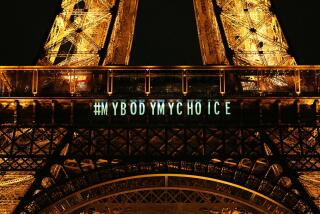Developer of Disputed Abortion Pill Receives Prestigious Award
- Share via
NEW YORK — America’s most prestigious medical award was given Wednesday to the developer of the controversial French abortion pill, a decision criticized by anti-abortion activists.
Other winners of Albert Lasker Medical Research Awards were Lewis Thomas, the writer and doctor, and four scientists who study how cells receive chemical and physical messages.
Dr. Etienne-Emile Baulieu studied the workings of hormones for nearly 30 years before provoking an international ethical debate with his discovery of the drug RU 486, which prevents a fertilized egg from developing into a pregnancy.
Not Approved in U.S.
The drug, reportedly being used for about 15% of elective abortions in France, has not been approved in the United States, but it has provoked a storm of controversy here nonetheless.
Opponents have threatened boycotts of any company that should choose to sell it in the United States, and abortion-rights advocates have promised to lobby for the pill’s sale in the United States.
Dr. John Willke, president of the National Right To Life Committee in Washington, was sharply critical of the Lasker jury’s recognition of Baulieu.
“His achievement is to kill people,” said Willke, who learned of the award before it was announced. “It’s outrageous that they would give this to a man whose achievement is to develop chemical warfare against the unborn.”
Patricia Ireland, executive vice president of the National Organization for Women, applauded the award, saying, “It’s an encouraging sign that the know-nothings are not going to stop the medical research community from honoring Baulieu’s contribution.”
Dr. Michael E. DeBakey, chairman of the Lasker awards jury, said the controversy surrounding RU 486 did not influence the jury’s selection of Baulieu.
Baulieu’s award was for clinical, or applied, research. The award for basic research recognized four researchers who study the substances in cells that allow cells to respond to hormones, growth factors and neurotransmitters, the awards jury said.
The four are: Michael J. Berridge of the University of Cambridge, England; Alfred G. Gilman of the University of Texas Southwestern Medical Center in Dallas; Edwin G. Krebs of the Howard Hughes Medical Institute and the University of Washington School of Medicine in Seattle, and Yasutomi Nishizuka of the Kobe University School of Medicine in Japan.
Lewis Thomas, scholar-in-residence at Cornell University Medical College in New York and president emeritus of Memorial Sloan-Kettering Cancer Center in New York, received the Albert Lasker Public Service Award for his writings on medicine that, the committee said, “have heightened and transformed the public’s perception of biomedical science.”
The Lasker awards are a kind of American Nobel Prize for medical research and often foreshadow the choices of the Nobel judges. Forty-six Lasker Award winners have gone on to win the Nobel Prize, often within a few years of receiving a Lasker Award.
More to Read
Sign up for Essential California
The most important California stories and recommendations in your inbox every morning.
You may occasionally receive promotional content from the Los Angeles Times.










